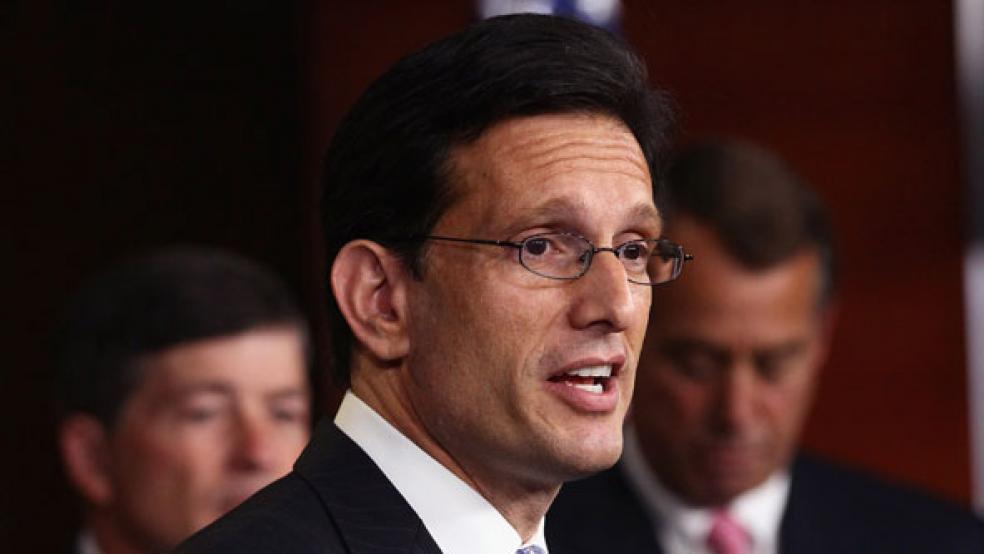The “crunch time” negotiations over a deficit reduction plan have found at least one issue for Republicans and Democrats to agree on: opposition to temporarily raise the government’s $14.3 trillion debt ceiling.
House Majority Leader Eric Cantor, R-Va., told reporters Tuesday afternoon that he prefers that Congress hold just one vote. “I don’t see how multiple votes on a debt ceiling increase can help get us to where we want to go, which is we want big reforms, big spending cuts, big changes to how this town works,” he said. “I’m not so sure that if we can’t make the tough decisions now why we would be making those tough decisions later.”
House Minority Whip Steny Hoyer, D-Md., echoed Cantor’s all or nothing sentiment and said he “very strongly” opposed the idea of a temporary increase as a way for the U.S. to avoid defaulting on its debt.
“Temporary [solutions] continues to roil the markets, it continues to send the message to the world, to lenders and to our own businesses here in this country that the Congress cannot come to grips with doing what it responsibly knows it must do and simply kicks the can down the road for 60 days, 90 days 120 days,” Hoyer told reporters Tuesday. “All that does is continue this uncertainty.”
House leaders’ rejection of a short-term fix counters the suggestion, made over the weekend by Senate GOP Leader Mitch McConnell of Kentucky, for a series of smaller debt ceiling increases. Speaking on CBS’ “Face the Nation,” McConnell said that if a deficit reduction plan doesn't include significant long-term entitlement changes, legislation to raise the debt ceiling for a few months is likely and the issue would have to be revisited this fall.
Hoyer admitted that a “temporary hike is better than none.” But he called for a “clean” vote on the debt ceiling, one that would raise the government’s borrowing authority until January 2013.
Lawmakers will continue negotiating a bipartisan deal that would raise the government’s borrowing authority. Republicans insist an increase in the debt ceiling should be matched with dollar-for-dollar spending cuts. The Treasury has warned that failure to increase the debt ceiling by Aug. 2 would cause the U.S. to default for the first time in history and be catastrophic for the anemic economic recovery.
Meanwhile, the Vice President Joe Biden-led deficit reduction discussions resumed Tuesday afternoon. There are at least three meetings scheduled this week as the group faces a self-imposed July 1 deadline to find compromise on big ticket items such as Medicare and Medicaid, which are the biggest drivers of the long-term deficit on the spending side, and taxes. “We have hit the point at which we are at some really tough stuff. Big numbers, big changes to popular programs. Everything is on the table except tax increases,” Cantor said. “We’re being flexible. We want to go and provide a recipe for a return to growth.”
Senate Republicans recently voted to end the government's subsidy of ethanol, raising questions about other tax breaks that might be eliminated as a way to reduce deficits. “You could save a significant amount” on eliminating some of the tax expenditures, said Rep. Chris Van Hollen, D-Md., after emerging from the two-and-a-half hour meeting. He refused to get into specifics of the talks.
One potential area of compromise includes saving at least $18 billion over 10 years by eliminating student loan subsidies to those in graduate school. Another idea floated would allow federal workers to contribute more to their pensions. Farm subsidies also could be on the chopping block.
But as the deadlines quickly approach, there is concern that the group—six Republican and Democrat lawmakers—may not be able to find compromise.
“That’s the goal,” Van Hollen said. “People are working in good faith to try and get there. “But we have lots of big differences and we are trying to find a way through them.” Last week Biden said his negotiating team would be able to find $4 trillion in savings from the federal budget over 10 years.
Early Tuesday morning Treasury Secretary Timothy Geithner said he is confident policy makers would strike a deal on the budget in time to avert a default crisis this summer. "We're going to have a bipartisan, comprehensive long-term deficit reduction framework. The question is, what is going to be the shape of that framework," Geithner said at The Wall Street Journal CFO Forum. Geithner added that the group has “made a lot of progress” in shaping a framework for a deficit reduction package.
Meanwhile, a group of Tea Party-backed Republicans in the Senate and the House plan to announce Wednesday that they will not support an increase in the debt ceiling unless they get “substantial” spending cuts next year, enforceable spending caps, and a vote on a balanced budget amendment to the Constitution.
Related Links:
Biden, Congress Tee up Crucial Week on Debt Limit (Reuters)
Republicans Increase Demands for Biden Talks (USA Today)
Biden Debt Talks Turn to Taxes, Entitlements (Bloomberg )





